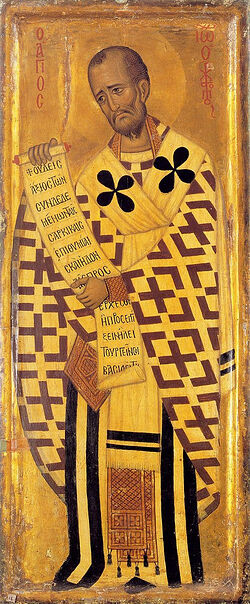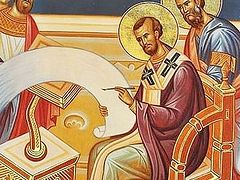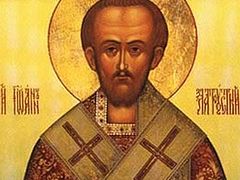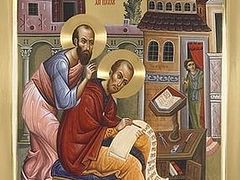The righteous shall be in everlasting remembrance
(Ps. 112:6)
 Today, a name is glorified throughout the entire Orthodox Church—the name of the great teacher and saint of Christ, Holy Hierarch John Chrysostom. Everything is filled with him. Everyone strives in one way or another to express their love and reverence for the glorious shepherd of Christ’s flock. The Church of Constantinople, on whose throne this great luminary once shone, now rejoices. The Church of Antioch is also triumphant, because in it he grew and was strengthened. And the Russian Church also celebrates him, having been so assiduously edified by his works throughout all the centuries of its existence. What happened to give rise to this solemn celebration of the memory of St. John Chrysostom?...
Today, a name is glorified throughout the entire Orthodox Church—the name of the great teacher and saint of Christ, Holy Hierarch John Chrysostom. Everything is filled with him. Everyone strives in one way or another to express their love and reverence for the glorious shepherd of Christ’s flock. The Church of Constantinople, on whose throne this great luminary once shone, now rejoices. The Church of Antioch is also triumphant, because in it he grew and was strengthened. And the Russian Church also celebrates him, having been so assiduously edified by his works throughout all the centuries of its existence. What happened to give rise to this solemn celebration of the memory of St. John Chrysostom?...
Fifteen centuries of unceasing and undiminished influence on the entire Christian world, its power and scope ever increasing —this is the triumph of the great spirit over death and time, to which everything human is subject. This is a kind of historical miracle. This is what compels us, at the turn of new centuries and millennia, with the great saint’s same, unchanging influence, to turn to him with all our souls, to pour out before him all the gratitude of loving children, and to praise him with all the praises of which we are capable. This is what is happening now throughout the entire Orthodox Church. The great hierarch John is being hymned everywhere, and thousands of praiseworthy words are being uttered in honor and memory of him.
But who can properly praise St. John Chrysostom? Even St. Proclus of Constantinople, one of his closest successors on the pulpit, said that no one could match him unless another such John should appear. But the Church had only one John Chrysostom, and therefore there are no words worthy for this servant of the Word. However, since his memory, which, in the words of the same St. Proclus, consists of his countless labors, exploits and instructions, like a river overflowing with waters, solaces the souls of the faithful, then you and I, brothers, ought to join this river and drink from its life-giving waters.
What attentive Christian does not know the name of St. John Chrysostom? Almost every day for a whole year, his wonderful work—the Divine Liturgy—sanctifies the faithful. We pray using the prayers he composed. And on the bright night of Christ’s Resurrection, who has not experienced a moment of great spiritual delight while listening to his Paschal homily? Who among the faithful, having at least once tasted of the sweetness of his infinitely edifying and highly talented works, would not be drawn to them again with irresistible force? Who has not at least once had the marvelous image of his holy life and his sorrowful but blessed death penetrate his consciousness? And what seems more wonderful to us in St. John: his life or his works? This question could not have been solved if Chrysostom’s life and works had not represented one whole, if they had not formed a single integral personality, in which his works are inseparable from his life and his life from his works. St. John Chrysostom continues to live in his works—and not only in heaven, for his works owe their origin to his holy life and exceptional work—the salvation of his neighbor. So, his life and his works are truly wonderful.
The life of St. John Chrysostom arouses reverent awe in us. From his first conscious movement to his last breath, his life was wholly dedicated to God. There are no gaps or omissions in it, no backsliding or sidestepping. Like an arrow shot from a bow and rushing straight to its goal, so the short life of St. John is one swift run to honor of the highest rank. St. John firmly held the helm of his ship of life, always guiding it to the quiet haven of the Heavenly Kingdom. No deceptive mirages made him doubt the dignity of his goal, its exceptional value and superiority over all other life goals. Neither was he tempted by the difficulty of the path, filled with many sorrows and hardships. Even when instructed by the care of his rare and amazing mother, Anfusa, whose name can never be omitted when speaking of St. John Chrysostom, not only in Christian rules and Christian wisdom, but also in secular sciences, moreover from the best teachers of that time in the city where St. John lived, which had not yet lost its former glory in this respect—Antioch of Syria, the capital of the whole East and the center of its enlightenment. St. John could have boldly and quickly won for himself a brilliant position in life, become a celebrity, and perhaps a great dignitary. But he was not seduced by such prospects shown him, which thousands of young men, less gifted and less educated, could not have resisted. And that brief period when he applied his secular knowledge was for him only a way and a means of familiarizing himself with the world of poverty, grief, and various calamities, which later became so useful to him in his purely pastoral ministry, and which directed him to this path of the highest and most perfect service to God and neighbor. Both by his own ideal motivation and miraculously guided by Providence, which prepared in him a great lamp of the Church, St. John, like the Apostle Paul he so loved, considered all these external advantages as rubbish. And for the sake of Christ, he chose the best and surest way to prepare himself for his exceptionally important life’s work—that is, pastoral care. This is the path of asceticism, personal spiritual perfection, which, corresponding to St. John’s own ardent desire, was the best preparatory school for his great pastoral ministry. For in general it must be recognized that there isn’t nor can there be fruitful service for the salvation of others where there is no consciousness of the need to first overcome one’s own passions, and to strive steadily to fulfill God’s commandments. Chrysostom perfectly portrayed this joining of personal righteousness and ascetic labors to pastoral ministry in his truly classic work on pastoral theology, “Six Words about the Priesthood.” So, mistakenly it may seem to some that there is no connection between the six-year period of St. John Chrysostom’s life of strict asceticism in the Syrian mountains and his subsequent pastoral ministry, or that one period contradicts the other, and only his illness and ill health—unfortunate for him but fortunate for the Church—caused Chrysostom to depart from the desert to Antioch, from seclusion to the pulpit. Between those and other periods of St. John Chrysostom’s life there is a most profoud inner connection, the strictest unity of purpose, and direction of life. It was in the desert that the foundations of St. John’s deep pastoral influence were laid. It was there that his love for his neighbors and zeal for their salvation were purified and ignited into a great flame, the most eloquent evidence of which are the many pages of his works from that time and all his subsequent works. Here he further broadened and deepened his knowledge of the word of God, the divinely inspired scriptures, which guide us to salvation (2 Tim. 3:15), and here, no doubt, he was accustomed to fervent prayer, without which pastoral labors are unthinkable. How necessary, therefore, to praise that solitude, which later became the salvation of many multitudes! O blessed is the desert that gives the world a great shepherd!
Thus, St. John Chrysostom took up the cause of the salvation of his neighbors; and of course, serving this great cause, the source and model of which is the very redemptive love of God, he saved others according to the immutable law of true spiritual life, and was saved himself, ascending in degrees of spiritual perfection, until he reached immeasurable glory eternally in heaven and in history on earth. St. John Chrysostom’s service to the Church, which fell to the last twenty years of the fourth, and first years of the fifth centuries, was not accompanied by any struggle for dogmas, as was the preceding and subsequent time in the history of the Church, and which was the glory of St. John Chrysostom’s older and younger contemporaries, other great fathers and teachers of the Universal Church. The time of St. John’s ministry is, as rightly noted, a time of “dogmatic peace,” and his activity was the activity of a great moral reformer, a great fighter for the purity of Christian life, for the full and therefore only true realization of the unconditional gospel commandments and ideals. The fruits of this indefatigable activity and this most intense struggle remain by their very nature invisible to us who are centuries removed from that time, but we can judge them by the effect that the only remaining works of St. John produce on us; and they will be revealed in all their glory on the day when not only the external, but also the entire internal, so to speak, history of the Church, the hidden life of all its members will be revealed. Then, when the whole historical life of the Church of Christ on earth will be summarized and concluded, then all that immense and valuable good that the great saint sowed in the souls of the faithful with the gracious help of God will be revealed, and his exceptional, one might say, unique significance will be determined in the history of the Church. After all, to support a poor traveler to the Heavenly Fatherland—that is, man in his fatal struggle with ever seductive sin, a struggle that decides his eternal fate, to shake off laziness, drive away despondency, save him from despair, spiritual death—what a noble and truly Christian task this is. But St. John pursued this and only this, and moreover, successfully and victoriously. And what innumerable pledges of irresistible moral influence are cherished invisibly in the hearts of hundreds of generations of Christian people, beginning with his immediate listeners and members of his flock. But even what is recorded on the pages of ecclesiastical-historical chronicles clearly indicates the degree of St. John Chrysostom’s pastoral zeal, and of its successes. It is these chronicles that speak of the help provided by St. John to his flock at a difficult time for it, when the king’s anger broke out over it; about the correction of the morals of the Antiochians, which occurred under the influence of their pastor’s preaching; about St. John Chrysostom’s great missionary concerns, especially in the last period of his life; about how the people of Constantinople treated him, and how The Empress Eudoxia herself, who had caused so much evil to the prelate of Christ, then humbly asked for forgiveness for the sin she had committed in the person of her royal son, Emperor Theodosius. How many souls have been saved from eternal perdition by St. John—and he can boldly say of a great multitude: Behold I and the children God has given me (Is. 8:18; Heb. 2:13). Oh, truly blessed is John, for he served in the salvation of so many people!
How did St. John Chrysostom act so powerfully on people’s hearts? What were the means of his irresistible moral influence? The simplest albeit incomplete answer to this question is that the power of Chrysostom’s influence was in his word. Yes, for St. John Chrysostom the ministry of reconciliation, that is, pastoral ministry, was primarily a ministry of the word. Everyone unanimously recognizes St. John Chrysostom as the greatest preacher of the Eastern Church. For him, the name Chrysostom (“Golden tongue”) was established and became his own. Experts in the art of ecclesiastical eloquence claim that the best school for those who want to become good preachers is the study of the works of St. John Chrysostom. So eloquent and at the same time so simple, so edifying and at the same time so fascinating; to preach as St. John Chrysostom preached, as he alone could preach—and despite the one and a half thousand years since the golden tongue of the universal saint was silenced, to this day he remains unsurpassed. His brilliant sermons, which are mostly interpretations of the Holy Scriptures, are remarkable for the pure evangelical spirit that pervades them. St. John Chrysostom was a preacher of pure, unadulterated Christianity, the true Gospel. Not in vain is the mouth of Chrysostom called the mouth of Christ. At the same time, Chrysostom’s sermons reveal such an amazing knowledge of the human soul, of all the secret bends of the human heart, that they leave the listener or reader speechless, conquered, and captivated. What is the secret of this inimitable eloquence, where is the key to unraveling such an amazing homiletic talent? Not in natural gifts alone, which of course God generously bestowed on St. John Chrysostom from his youth and which he, as a good and faithful servant, multiplied with his diligence and work; and not in school and its exercises, which he passed before his age. We know other fathers and teachers of the Church who are gifted by nature and have gone through the same rhetorical school; but in their sermons, there is more artfulness and less simplicity, sincerity or profound edification than in the sermons of St. John Chrysostom. And the secret of Chrysostom’s unique and incomparable eloquence lies in his love for his listeners, in the deep moral bond which he had with his flock. “You are everything to me,” he confessed to the people one day, “If my heart were torn and revealed to you, you would see that you are all there at great length: women, children, and men” (Conversation on the book, Acts of the Apostles). He accepted with all his heart the Savior’s commandment about the relationship of a good shepherd to his sheep; that is, not only the shepherd’s external belonging to the sheep, but such an inner relation to them that it approaches, if not directly passes over into an essential relationship. And love makes a person eloquent even without natural gifts, especially if it sees the one it loves in danger—a danger that is, from a Christian point of view, the loss of salvation. It also compels him to share with those he loves the content of his spiritual life. Just as the Father loves the Son and shows Him everything that He Himself does (John 5:20), so the human spirit, enlightened and enlarged by love, naturally pours out its abundance far beyond itself. But it is not easy to acquire the gift of love. It is the most excellent way (1 Cor. 12:31), and one needs to pass through the whole rock of virtues, truly become a saint, in order to acquire this pearl. And above all, one must have that unshakeable faith that St. John Chrysostom possessed and which borders on vision. In general, St. John Chrysostom was not a dogmatist; he does not explore the mysteries of faith, but underlying all his writings, but his deep faith in the basic dogmas of Christian teaching is the unshakable foundation and the deepest spring from which the rivers of his instructions flow. It can be said with certainty that for him the invisible, spiritual world was incomparably more real than the visible, sensual world, and his whole order of contemplation was the opposite of ours, for we are at the mercy of external feelings and concrete concepts. Thus it is necessary to acquire his boundless mercy and love for the lesser brothers of Christ—that is, the poor and the needy of all kinds, for whom John Chrysostom did so much with his sermons and to whom he gave literally everything he had.
Great was John Chrysostom in his life, but was he great also in his very death, which as we know occurred in exile, after occupying the most important throne of the Eastern Church—the cathedra of the capital city. “O John!” we will exclaim together with St. Proclus. Your life was truly filled with sorrow, but your death is honorable, your tomb is glorious, your reward is great! The death of St. John Chrysostom is touching, and the deathbed instruction that he gives us all in his last words is deeply edifying, Glory to God for all things! Surely, we also thank God for giving such a saint to His Church; for one ecclesiastical writer rightly said that there is no person so insensitive as would not thank divine Providence for giving the world such a brilliant luminary. Let us be edified by his immortal works, for to not know such beautiful works, in the words of the same ecclesiastical writer, is the same as not seeing the sun at noon. Let us take to heart his most important precepts, the study of the word of God, the labor of prayer, and almsgiving— the “queen of virtues.” And we will be ever confident that his heavenly glory will always be reflected by his eternal glory on earth—according to the words of the Psalm: the righteous shall be in everlasting remembrance. (Ps. 112:6).
Amen.



